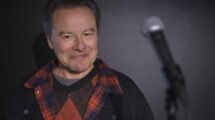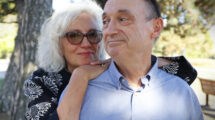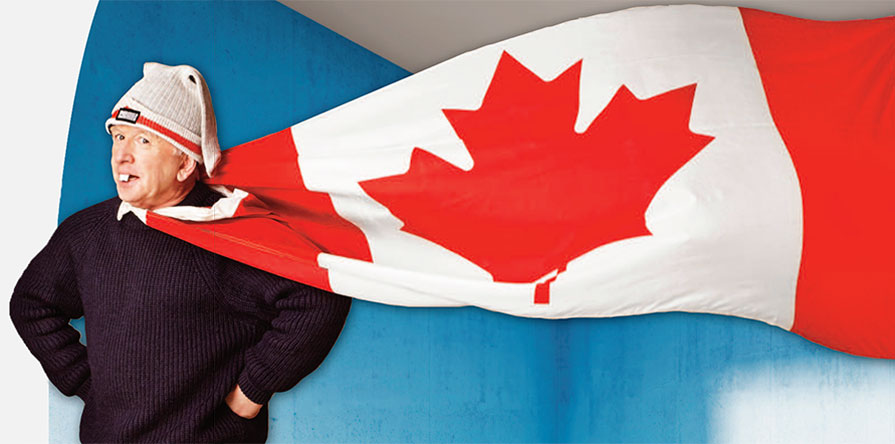 By Iris Winston and Photos by Rino Noto
By Iris Winston and Photos by Rino Noto
A stand-out among stand-ups for his way with wit and words.
Ron James takes comedy very seriously. Frequently called “the funniest man in Canada,” the stand-up comedian draws his varied material from his life experiences, good and bad, the political and social spectrum and assorted embarrassing moments, all aimed at connecting with his audiences.
“When I recall the days of childhood or hockey or the inadequacies of my youth, it’s not because it was an awful time,”says Ron, who was born in Glace Bay, Nova Scotia, and grew up in Halifax.“It’s because I’m not perfect and in the telling and sharing of my imperfections, I think people see their own.” “We’re surrounded by change and we get so much information, we don’t know what’s going on,” says the award-winning comedian.
“We’re all so overwhelmed by the daily shift in the terra firma and the mass of information and expectations we take on ourselves, that when someone shares their own frustrations, inadequacies, or hopes and dreams or sensibilities, audiences see themselves in a world that’s become increasingly fractured and polarized.It’s a wonderful feeling to get 2,000 people from different walks of life in the audience on the same page.” He goes on to explain that this means of bringing people together is at comedy’s core.
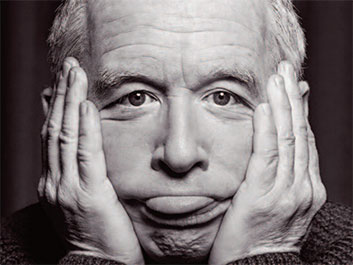 “It’s what comedy does.Other comedians do it as well.I’m just fortunate that I’ve been able to make my living in Canada by dedicating myself to embracing the idiosyncrasies or, as I call them, the virtues of people and place, and finding sustenance in the singing I’ve heard from coast to coast. I want to celebrate the great opportunity I’ve had springing my trapline from Cornerbrook to Courtenay Comox and enjoy the good things about living here.”
“It’s what comedy does.Other comedians do it as well.I’m just fortunate that I’ve been able to make my living in Canada by dedicating myself to embracing the idiosyncrasies or, as I call them, the virtues of people and place, and finding sustenance in the singing I’ve heard from coast to coast. I want to celebrate the great opportunity I’ve had springing my trapline from Cornerbrook to Courtenay Comox and enjoy the good things about living here.”
“That’s what I love about the work,”he continues.“It gives me the opportunity to make something along with the laughs.I believe it’s a comedian’s job to lighten the load of an audience, not to add to the strife.That, they can get somewhere else by turning on the news or going to church to hear a sermon.” His motto for performance and material is simple, he says. “If the ushers aren’t wiping the seats down after the show, I haven’t done my job.I’m not one for stony silence.I just want to hear seat-soaking laughs.”
The point for Ron is to ensure that his audiences leave the theatre “feeling lighter and maybe enlightened about a couple of things.” The fast-talking, fast-moving comedian explains that his philosophy is to give value for money by including as broad a swath of material in his two-hour shows as possible.
Noting that “comedy comes from chaos,” he offers “a pretty eclectic buffet.I talk about mid-life, generational differences, playing hockey, growing up, politics in different regions, a little bit of everything.And I don’t rely on the same content all the time. I think it’s really important to be marching to the right side of history and to be progressive and not play to the common denominator of anger and vitriol.” With a tip of the hat to the jesters at medieval courts, he says that he believes part of a comedian’s job is to speak truth to power.
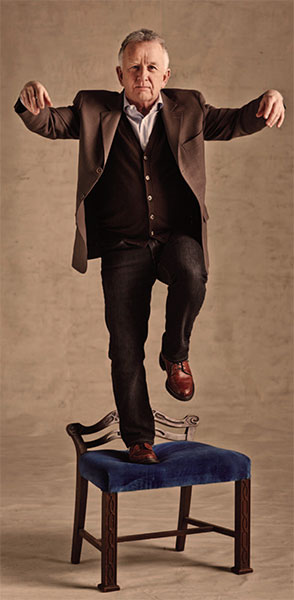 Thus, his rapid-fire comments send bullets flying in all directions. Such cracks as “the last prime minister couldn’t smile and the new one can’t stop” are almost missed while audiences are still laughing at a previous comment. Then, Ron might seem to be pointing out a step forward in freedom of speech when he says that Caitlyn Jenner (formerly Olympic gold medallist Bruce Jenner) supported Donald Trump during the 2016 U.S. presidential campaign, until he throws a sting into his conclusion — he announces that this “goes to prove that we are on the way to a world where a transperson can be anything they want to be, including an idiot.”
Thus, his rapid-fire comments send bullets flying in all directions. Such cracks as “the last prime minister couldn’t smile and the new one can’t stop” are almost missed while audiences are still laughing at a previous comment. Then, Ron might seem to be pointing out a step forward in freedom of speech when he says that Caitlyn Jenner (formerly Olympic gold medallist Bruce Jenner) supported Donald Trump during the 2016 U.S. presidential campaign, until he throws a sting into his conclusion — he announces that this “goes to prove that we are on the way to a world where a transperson can be anything they want to be, including an idiot.”
He reminds his audiences that CBC has broadcast a number of his specials, which their “tax dollars paid for” before heading on another track to describe home renovations as “the new religion of the middle class,” adding that he tried some do-it-yourself renos, but had to give up when he ran out of swear words. He reserves some of his more caustic comments for computer-related issues. He suggests that anyone seeking technical help with a computer and left“on hold for 45 minutes with odious music” playing in one ear, should take the precaution of having a second phone at the other ear to call into a suicide line if the wait becomes too frustrating. On flying, he notes that some airlines give passengers“less room than in a ventriloquist’s dummy box.”
He points out that “more people in the world have cellphones than toilets” adding, “this could explain why there’s so much crap on the Internet.” He complains about the excessive number of fishing regulations, advising people to “forget about bringing the kids fishing. Bring your lawyer instead.” He digs at New Age attitudes, saying that the word “artisan” attached to any product signals “you just pay a lot more for it” and “a life coach is some New Age nob that charges you money for something you should get from a friend for free — advice.” And it was advice from a university professor that was a major factor in changing his career direction.
As a student of history and political science, he originally intended to go into teaching after graduating. Then, he took one course with Evelyn Garbary, the Director of Drama at Acadia University at the time. She spotted his potential as a performer.This led him to seek his fortune with the Second City comedy troupe in Toronto after completing his arts degree. “I was with those guys for ten years,”he says. “I learned standards with Second City.
They always said to play to the top of your intelligence and talk about what you know, what you feel, what you’ve learned and what you care about. You have to be proactive and have a positive intention.The world takes no prisoners and comedy doesn’t suffer fools. To achieve longevity in this line of work, you have to approach it as one would a postgraduate degree.” However, before he settled into a successful career in comedy, Ron tried his luck in Los Angeles in 1990, as a performer in a television series
“The series was cancelled,” he says. “So, for three years, I did what every journeyman actor does. I lived from gig to gig. I got a few sit-com parts, but I was out of work for a year. Everyone who went down there struggled.” By this time, he and his wife had had their second daughter and decided to return toToronto. “That’s when I shifted the paradigm and started my solo career,” says Ron.
“I wrote a one-man show about my time in LA and it got some good reviews.” In fact, the show, Up and Down in Shaky Town: One Man’s Journey to the California Dream, was a major success that is generally regarded as the launch of his life as a stand-up comedy star across Canada.
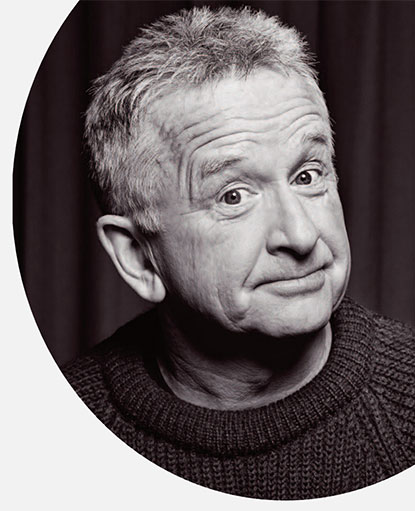 “I got my first stand-up cheque in 1995 and I have never looked back,” says the 59-year-old comedian, who still is regularly on tour across Canada.In addition, over the last 22 years, he has written such shows as The World Between My Ears — detailing his travels across the country — assorted television specials, including eight for CBC, his own series, The Ron James Show, for five years and an annual New Year’s Eve show. (It’s become a tradition to watch me,”he says.) However, he adds, “The television grail never lived up to my expectations in Canada.There’s so much politics and you have to please so many chefs.”
“I got my first stand-up cheque in 1995 and I have never looked back,” says the 59-year-old comedian, who still is regularly on tour across Canada.In addition, over the last 22 years, he has written such shows as The World Between My Ears — detailing his travels across the country — assorted television specials, including eight for CBC, his own series, The Ron James Show, for five years and an annual New Year’s Eve show. (It’s become a tradition to watch me,”he says.) However, he adds, “The television grail never lived up to my expectations in Canada.There’s so much politics and you have to please so many chefs.”
Through it all, it seems that touring and playing to live audiences remains his first love. “Touring is exhausting,”he says. “Sure, the driving gets old, the food gets old and waking up in a hotel room gets old, but my people were miners, hewers of wood and drawers of water.They worked below the belly of the earth or at the phone company or wherever.
Everything you love to do has a price.Mine happens to be tough drives on the highway, stale hotel rooms, dry air and driving whatever ergonomic nightmareAvis has provided that day.But there is nothing better than stepping on the stage of a full theatre with an audience who’s come to laugh.It’s an authentic experience not driven by hype or spin or publicity.It’s a grassroots fan base that I’ve built one kilometre at a time over 20 years.” “That’s what people want these days when so much is driven by electronics,” he adds.
“You don’t get the stand-up experience watching some thing onTV that you get watching somebody live. Then, it’s a bit of a communal experience. Comedy acts as a ballast to a world that’s constantly shifting.” “The fact that people have pulled away from that digital crack house Netflix to come to see me, that I can fill a theatre when there’s so much to keep them home is not a responsibility I take lightly,” he emphasizes. “I do what every comedian who cares about his craft and respects his calling does:I work hard at getting better.” There have, of course, been tough times over the years, before, during and after the LA experience.
Career Influences for Ron James
Evelyn Garbary
When he was a student at Acadia University, he took a drama class with Evelyn Garbary, then the Director of Drama there.Before immigrating to Canada in 1956, she had studied at the London Academy of Music and Drama, performed at the OldVic in London andAbbeyTheatre in Dublin.A major influence on theatre development in the Maritimes, she regularly served as a director and adjudicator across Nova Scotia. She was the first to notice Ron James’ potential as a performer.
Second City
The Second City comedy/improvisational troupe presented its first comedy revue in Chicago in 1959 and opened its own theatre in the city eight years later.In 1973, Second City opened a theatre inToronto. By the mid-1970s, both venues had become sources of cast members for the television shows, Saturday Night Live and SCTV.Second City has been the launching pad for numerous comedians in its 50+ years. Ron James took classes with Second City for a year, then worked with theToronto organization for the next decade as “a scrawny satirist.”
Los Angeles
Ron James spent three years in Los Angeles, trying to break-in as an actor.He turned the negative experience into a one-man hit show, Up and Down in Shaky Town: One Man’s Journey to the California Dream, after returning to Toronto.
Billy Connolly
Billy Connolly, a former welder and folksinger and sometime actor, is best known as a stand-up comedian. He is periodically criticized for the irreverence of some of his subject matter.The Scottish comedian’s freewheeling style, although very different from his, helped Ron James chart his own course of comic irreverence.
His marriage of 23 years was one of the casualties associated with his spending so much time on the road.On the professional front, he had concerns early on, about the programming of the Just for Laughs comedy show. “If they worked as hard bringing Canadian acts to the States as they do in bringing American acts into Canada, some of us wouldn’t be lost in the meat grinder of Los Angeles, ”he says.
“And the company’s the star, not you.You’re just the third comedian on the bill.” He also quickly discovered on his return to Canada that agents were unfamiliar with booking stand-up comedians. (An attempt to work with a Toronto agency of “Big city b- sers” proved to be a mistake, he says.) “I couldn’t just stay home and wait for the phone to ring after my years in Los Angeles, so I booked myself, until I partnered with Shantero Productions,” says Ron.
“They’re honest and hard working and have my back.” Currently, as well as continuing to tour across the country, he is completing a book. All Over the Map is to be published by Random House before the end of 2017. Ron describes it as “more of a travelogue than a memoir. “It’s a bunch of different stories linked by a common theme of people and place — talking about where I’ve been, where I am and where I’m going.”
The direction appears to be more touring, although he admits that his “knees click a bit now. I used to finish my shows with a couple of beers and make a dent in a bottle of Scotch. Now I finish with twoTylenol and make a dent in a bottle of Gatorade.” A few aches aside, he is happy with his life, says Ron. “I have a great relationship with my daughters. And if I can keep touring and doing my specials and writing my books, life is good. Performing live is all about empowerment and channelling your life force. There’s nothing better.”




